2021 NAEd/SPENCER RESEARCH DEVELOPMENT AWARDEES
David Liebowitz, University of Oregon
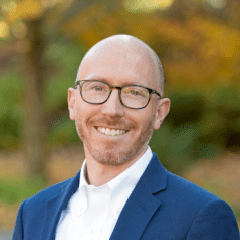
David Liebowitz is an Assistant Professor in the department of Educational Methodology, Policy and Leadership at the University of Oregon. David studies the challenges facing schools with concentrations of traditionally under-served students as well as policy and leadership strategies to address these challenges. His work has been published in leading educational journals including the Review of Educational Research, the American Educational Research Journal and Educational Evaluation and Policy Analysis and has been featured in prominent media outlets such as The New York Times, Education Week and Chalkbeat.
Prior to Oregon, David was a middle school principal in Chelsea, Massachusetts for five years. Previous to that, he taught 6th through 8th grade English in Colorado for six years, served as a policy advisor to the Massachusetts Secretary of Education and the New York Commissioner of Education, and was a policy analyst at the Organisation for Economic Co-operation and Development (OECD) in Paris. He holds an undergraduate degree from Columbia University and graduate degrees from the Harvard Graduate School of Education.
Principals’ Contributions to Student and Teacher Outcomes in Oregon
School principals have long played a central role in managing building operations and supervising school employees. Over the past two decades, however, policy developments have increased expectations that principals also improve school climate, instructional practices, and student outcomes. While mounting evidence highlights that principals do exert substantial influence on these contemporaneous outcomes, there remain important methodological questions about how to best examine principals’ contributions to these near-term outcomes. Critically, even less is known about principals’ effects on longer-term student outcomes. This project will examine how students’ high-school and post-secondary outcomes are influenced by their principals in elementary and middle school. My analysis will draw on over 13 years of statewide data on students and educators in an effort to obtain reliable and unbiased estimates of principal effects on contemporaneous and longer-term outcomes. The findings from my proposal have the potential to inform educational agencies’ decisions regarding investment in school leaders. The project builds on an existing partnership with the Oregon Department of Education to improve statewide human resources management policies for school leaders.
Bayley Marquez, University of Maryland
Bayley J. Marquez is an Assistant Professor in the Department of American Studies at the University of Maryland, College Park and an Indigenous scholar from the Santa Ynez Band of Chumash Indians. As an Indigenous scholar, she acknowledges that her work and scholarship takes place on Piscataway land, former plantation land, and within a land grant university funded by the seizure and sale of Indigenous lands. With a focus on space, land, material relations, and schooling, this acknowledgement is necessary to position her work within the structure of settler colonialism and her own lived experiences. Her research interests include settler colonial theory, Indigenous education, Black education, the history of education, abolitionist university studies, and critical ethnic studies. Her academic work is positioned at the intersection of settler colonialism, imperialism, conquest, and other instantiations of racialized power. Her research underscores the connections and intersections between Indigenous education and Black education, particularly the pedagogical projects that affected both groups and became a part of commonsense understandings of schooling. Her archival research has been supported by the Ford Foundation and the Joseph A. Myers Center for Research on Native American Issues. She has received a number of awards including the College of Arts and Humanities Junior Faculty Summer Fellowship and a UMD Independent Scholarship, Research, and Creativity Award. Her co-written work has been published in the edited volume Health and Social Issues of Native American Women and she has articles forthcoming in American Quarterly and Feminist Formations.
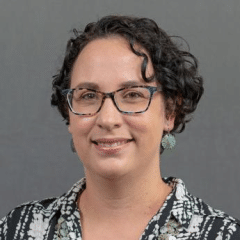
Teaching Slavery and Settlement: Plantation Pedagogy in Currents of Conquest
This study examines the interconnection between Black and Native American educational history through a focus on the Industrial education model of the Hampton Agricultural and Normal Institute. Scholars have noted that this model was highly influential, shaping education in the Black South, Indian country, and internationally, in Africa as well as in locations in the Pacific such as Hawaii and the Philippines. Through an archival analysis, I examine the way teachers, administrators, staff, and policy makers who supported the Hampton model of education discussed industrial education for different racial groups in comparison to each other. I argue that this model of education rested on racist language that tried to reframe slavery in the South as having educational benefits to slaves. By justifying slavery as educational, the Hampton Industrial education model focused on teaching Black, Indigenous, and other people of color to value labor and proximity to white civilization as a means of learning. This form of pedagogy was linked to policies that resulted in the dispossession of Indigenous land, for example in the use of allotment as an both a redistributive tactic and aspirational educational program. These connections between justifying slavery and land dispossession as educational, inform my analysis of the interrelated processes of slavery and settlement and how they are constituted in educational spaces.
Blanca Vega, Montclair State University
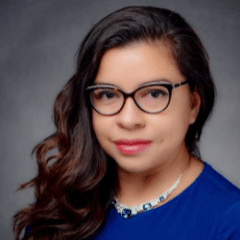
A native New Yorker, Dr. Blanca E. Vega is the daughter of Ecuadorian immigrants. Dr. Vega is currently assistant professor of higher education at Montclair State University. Her scholarship broadly focuses on equity, access, and success in higher education among underserved populations. Her primary area of research situates racism as one of multiple barriers that affects higher education experiences and success – not just for students, but also for administrators and faculty. Her research agenda includes studying racial conflict in higher education and organizational responses to these conflicts. Her secondary area of research explores leadership and policymaking and their impact on support for undocumented student in higher education. Finally, Dr. Vega continues to explore discourse and tensions around organizations that shape discourse around Latinxs and Latinidad.
Dr. Vega earned a doctorate (Ed.D) from the Higher and Postsecondary Education program at Teachers College, Columbia University. During and prior to that time, she worked in various administrative positions within higher education spanning over 16 years. Some of these areas include financial aid counseling and coordinating and directing New York State opportunity programs such as the Liberty Partnerships Program (LPP) and the Higher Education Opportunity Program (HEOP). Dr. Vega earned a Bachelor of Arts degree in Anthropology from Brandeis University and a Master of Arts degree in Higher Education at New York University.
Higher Education and Student Affairs (HESA) Administrators’ Experiences with Undocumented Students and Related State Policies
The goal of this project is to understand how higher education and student affairs administrators (HESAA) experience, interpret, and act upon varied federal, state, and postsecondary policies. This work will contribute to the field of higher education by exploring the skills, competencies, and knowledge HESAAs use to navigate such complex environments. The purpose of this research is to provide HESAAs with more guidance in their work with undocumented students so that undocumented students may feel more supported in postsecondary environments. The following questions guide this study: How do HESAAs navigate conflicting federal, state, and university politics and practices related to undocumented students? I plan to employ an embedded case study methodology, drawing on a sample of six states whose policy approaches fall into the three categories: inclusive (New Jersey and Minnesota); exclusionary (South Carolina and Alabama); and neutral policies (Pennsylvania and North Carolina). I will conduct in depth semi-structured interviews with HESAAs in each state as well as analyze relevant documents. Data from this research will be of interest to state and higher education policymakers, HESA professionals, and researchers. In particular HESAAs will be interested in understanding their role in possibly contributing or creating barriers to undocumented students’ accessing postsecondary benefits.
Derron Wallace, Brandeis University
Derron Wallace is an Assistant Professor of Sociology and Education at Brandeis University. He is a sociologist of race, ethnicity and education who specializes in comparative analyses of structural and cultural inequalities in London and New York City public schools, focusing specifically on the experiences of Black youth. Derron’s research has been published in sociology and education journals, including the flagship journal of the British Sociological Association Sociology, British Journal of Sociology of Education, International Studies in Sociology of Education, Cultural Sociology, Race, Ethnicity & Education, Gender and Education, and Harvard Educational Review.
With wide-ranging experiences in educational research, policy and practice, Derron has worked with displaced youth in Ethiopia, young people with disabilities in Rwanda, immigrant youth in London, economically disadvantaged rural youth in Jamaica, English language learners in Thailand and gifted students in New York City. He served as Special Assistant to the Minister of Education in Rwanda from 2009-2010. Derron also worked as a professional community organizer and consultant with local educational authorities in London between 2010 and 2014. For his scholarship focusing on Black youth in global cities, Derron received the 2019 Joyce Cain Award from the Comparative and International Education Society.
Derron received his Ph.D. from the University of Cambridge, where he was a British Marshall Scholar and a Gates Cambridge Scholar. He holds a B.A. from Wheaton College (Massachusetts), where he studied sociology and the African diaspora.
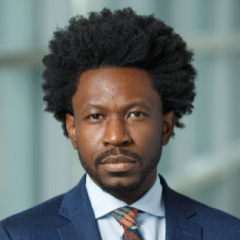
Student’s Safety as a Top Priority: Comparative Perspectives on School Safety in London and New York City
Students’ safety has become an increasingly pressing educational and political challenge over the past decade. Yet, there is a gap in educational research from comparative and international perspectives about how growing concerns regarding school safety influence the political formation and civic participation of young people in public schools and public life. In this cross-national sociological study, I examine how Black youth in London and New York City make sense of contemporary school safety crises and navigate such crises through their civic engagement in schools and society.
In this study, I draw on archival analysis, surveys, and in-depth interviews to: (1) assess young people’s perceptions and negotiations of increased school surveillance measures; (2) examine the impact of on-going safety concerns on the physical and psycho-social wellbeing of Black youth in contexts of heightened security post-9/11 and post-7/7; and (3) document the public and private alliances that young people and their elders develop to lobby lawmakers and civil society leaders to make schools safer. This project seeks to contribute to international educational research and public discourses by documenting the voices, visions and organizing victories of Black young people in the global cities they call home.
Hye-Young Yun, University of California, Los Angeles

Hye-Young Yun is a post-doctoral fellow at the University of California, Los Angeles (UCLA). Her overarching research interest is the social, behavioral, and psychological processes of youth (e.g., aggressive behavior, prosocial behavior, victimization) at school and the development and evaluation of intervention programs that employ a multilevel social-ecological approach, with a special focus on programs that address bullying situations. Her recent research has identified additional bystander roles in bullying situations (assertive defender, comforting defender, sympathetic outsider, indifferent outsider) and pinpointed the major characteristics associated with these roles. She is interested in highlighting the importance of both exploring heterogeneity in social behaviors and considering the influence of social norms and individual characteristics; in addition, she works to identify psychological processes, particularly among victimized youth, that drive the above-mentioned types of peer reactions. The ultimate goal of her research is to shed light on potential social policies that will promote healthy adjustment among youth in the school context. Hye-Young holds a BS in Biology from Ewha Womans University in South Korea and received her PhD in Human Development and Psychology from UCLA. Before joining UCLA as a post-doctoral scholar, Dr. Yun was a post-doctoral researcher at the INVEST Research Flagship Center/Psychology (KiVa anti-bullying program) at the University of Turku in Finland.
Supporting Victims of School Bullying: What Types of Help are Beneficial?
Although it seems reasonable to assume that receiving any type of help from peers would have a beneficial effect on a victim’s adjustment, my recent research has shown that in the case of school bullying, the association between receiving support and experiencing psychological distress is not straightforward. For students who experience bullying, having a peer publicly object to bullying behaviors reduces their depression, however, being comforted by a peer does not. While it is necessary to continue to encourage help-giving, it is essential to fully understand—from the perspective of victims—which types of help are most effective at decreasing victims’ distress. My project will propose and develop the “help-recipient attribution model,” which conceptualizes the cognitive-psychological processes that occur in bullying situations in the context of the complex relationships between victimization, type of peer support, causal attributions, classroom norms, racial/ethnic classroom composition, and school adjustment. Because victims often blame themselves for their plight, the study’s four aims are grounded in attributional cognitive processes: I will first identify the types of help that peers offer in bullying situations. Next, I will examine why certain types of help are more or less beneficial for victims’ adjustment as a function of characterological self-blame. Finally, I will integrate individual and contextual factors to test how the latter moderate the relationship between victimization and characterological self-blame. The findings will provide a detailed picture of the benefits of offering different types of support for bullied adolescents, and thus will have significant implications for anti-bullying interventions.
Xiaoming Zhai, University of Georgia
Dr. Xiaoming Zhai is an Assistant Professor in Science Education at the University of Georgia. He obtained his Ph.D. in curriculum and instruction (physics) at Beijing Normal University. His research focuses on developing and applying innovative assessments to support science teaching and learning. He employs cutting-edge technology such as artificial intelligence, machine learning, and mobile learning to enhance classroom assessment practices. He is a PI and Co-PI on two NSF-funded projects, respectively. He has published 39 journal articles, one book, and several chapters. He recently edited a special issue in the Journal of Science Education and Technology, titled Applying Machine Learning in Science Assessments. His article, Zhai et al. (2020). From substitution to redefinition: A framework of machine learning-based science assessment. Journal of Research in Science Teaching, 57(9), 1430-1459 was selected to feature Wiley’s Research Headlines as the most newsworthy research across Wiley’s 1600 journals. This research was also chosen by major academic media such as ScienceDaily, the American Institute of Physics, and the American Association for the Advancement of Science to advertise to a broad audience. He received the 2021 AERA TACTL Early Career Scholar and the 2021 Jhumki Basu Scholar Award from the National Association of Research in Science Teaching.
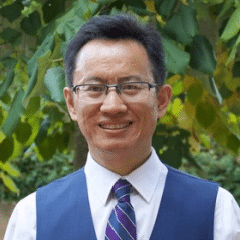
Does AI Have a Bias? A Critical Examination of Scoring Bias of Machine Algorithms on Students from Underrepresented Groups in STEM
This project will answer two research questions: (a) Are Artificial Intelligence (AI) algorithms more biased than humans when scoring students from underrepresented groups in STEM’ (SURSs’) drawing models and writing explanations in scientific modeling practice? (b) Are AI algorithms more sensitive to the linguistic and cultural features of the assessments than human experts? I will develop two sets of assessments that are aligned with the Next Generation Science Standards with varying critical cultural features. I will collect middle-school student responses from a school district where almost half are SURSs and recruit experts of both SURSs and others to score student responses. I will use 500 scored responses to develop multiple AI models for each item and use the models to score new testing data. I will compare machine severity on scoring SURSs’ responses with standard scorer’s (e.g., human consent scores), as well as examine how item cultural features interact with machine scoring capacity, as compared to human raters. The findings will inform the potential bias by using AI algorithms. Using knowledge learned in this project, educators can identify potential strategies to improve culturally responsive assessments and justify the use of AI to develop more inclusive and equitable science learning.
